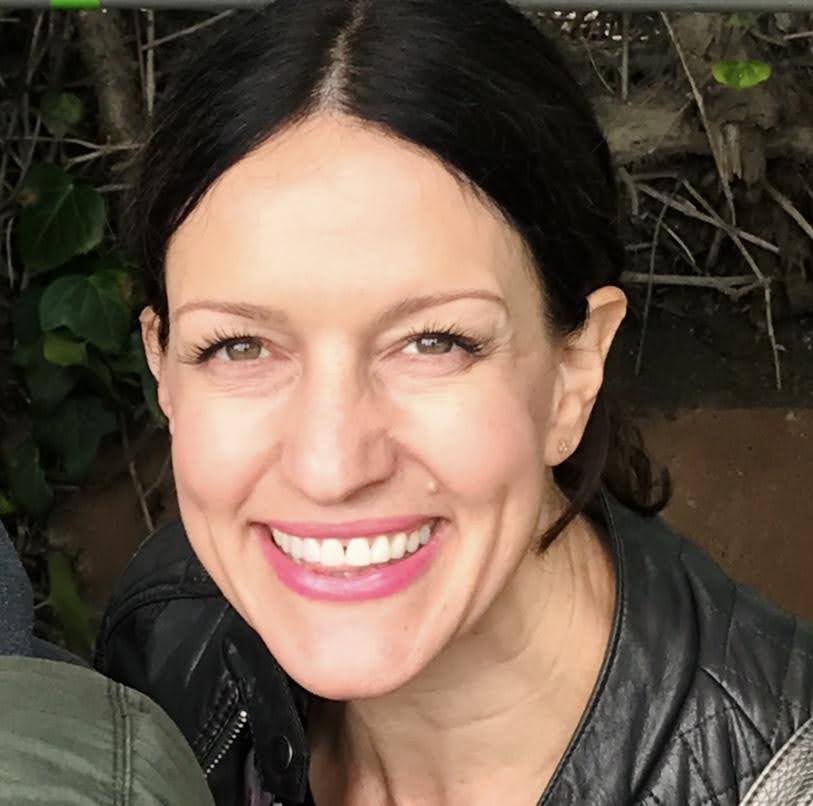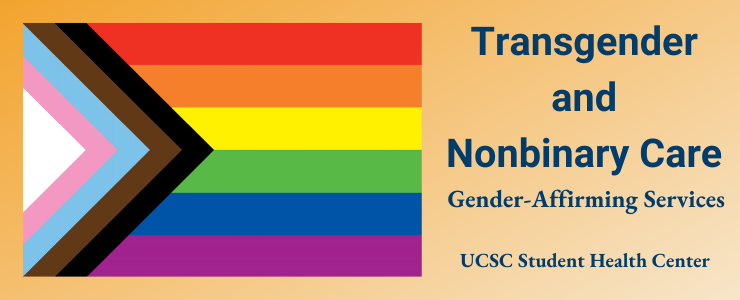Trans and Nonbinary Care
Welcome!
Welcome! We want every student to feel comfortable and safe advocating for the care they need. We believe good health means caring for both the body and the mind. Our healthcare team is committed to providing you comprehensive services that support your well-being.
Services Overview
What medical services are available for me at the UCSC Student Health Center?
- Refills for hormone therapy
- Initiate hormone therapy
- Case Management
- Referral for fertility preservation
- Referrals for gender-affirming surgeries (e.g. top surgery, bottom surgery, facial feminization)
- Referrals for additional specialized care (e.g. vocal training, hair removal)
- Routine physicals and general primary care (e.g. respiratory illness, diabetes, asthma, high blood pressure, immunizations, minor injury, etc.)
- Gynecological care
- Cancer screenings
- Breast/chest health screening
- Contraceptive care (birth control)
- STI (sexually transmitted infection) testing, diagnosis, and treatment
- Pharmacy (next door in our East Wing)
- SHOP for support for safer sex and alcohol and drug use (next to the pharmacy)
- CAPS for mental health support (upstairs East Wing)
How do I obtain referrals and/or access care?
Whether you are ready to start hormone therapy, to obtain a gender-related referral, or just wanting to learn more about gender affirming care, we welcome you to fill out an interest form online with Health e-Messenger. Select "Gender Affirming Care One Stop."
Within a few days of scheduling your appointment, a case manager will reach out to you to review insurance information and provide an overview of the gender affirming care process.
If you are an established patient with SHIP insurance and have already been receiving hormones you can schedule a General Primary Care Appointment or Medication Refill Appointment. For in-person appointments please call the appointment desk at 831-459-2500 and ask for General Primary Care Appointment or Medication Refill Appointment. For Zoom or telephone appointments, you can book online with Health e-Messenger. Select General Primary Care;Telehealth Primary Care.
Hormone Therapy
What is Hormone Therapy?
We recognize that "masculine" and "feminine" are imperfect concepts. We use the terms to describe hormone therapy and body changes.
- Estrogen (Feminizing Hormone Therapy)
- Testosterone (Masculinizing Hormone Therapy)
- Timeline for hormone changes
- Introduction to Female-to-Male Hormone Therapy from UC San Francisco*
- Introduction to Male-to-Female Hormone Therapy from UC San Francisco*
*These videos mention fertility preservation costs without medical insurance coverage. UC SHIP covers some of this. You can also ask your insurance if this service is covered for you. Please be advised that these videos were created in 2015 and use language that is now considered outdated.
Which medications are available and what are the typical doses?
The table below has the most commonly prescribed medications and typical dose ranges for each medication. Your health care provider will work with you to figure out which medications and doses are the best for you. Every individual’s body is unique, so the medication regimen will be adjusted according to how your body responds to the regimen. The general practice is to go “low” and “slow” so that your body has the chance to adjust to the medication.
With testosterone (masculinizing hormone therapy), most individuals will notice some changes within 6 months. With estradiol (feminizing hormone therapy), the changes can take longer, often 6 months to a few years.
See these typical medication doses for hormone therapy for estimates.
What is Low Dosing?
Low dosing (or what you may have heard as “microdosing”) means taking a lower dose of hormones for hormone therapy. In the chart below, you will see examples of what a lower dose is. When you are taking or administering lower doses of hormones, physical changes can happen more gradually as well as be more subtle.
Why would someone choose a low dose instead of doing a standard dose? There are a variety of reasons. Some individuals with pre-existing medical conditions may opt for a low dose to avoid HRT having a negative impact on their health. Some individuals desire more subtle changes. Speak with the provider who is initiating your hormones to discuss the specific changes you want to see, so they can suggest doses that may work for you.
See these typical low-dose hormone therapy amounts.
What standards of care does UCSC Health Center use?
Our providers utilize the UCSF Transgender Excellence of Care guidelines when we develop an individualized hormone therapy plan.
What is the process for initiating Hormone Therapy if you have UC SHIP?
1) Go to Health e-Messenger. Select “Schedule an Appointment”, once at type of visit choose "Gender Affirming Care One Stop Form". The options are to then choose between a synchronous or asynchronous visit. For a synchronous visit you will meet with a case manager via zoom at the date and time you select. A zoom link will be sent through Health e-Messenger prior to the appointment. For asynchronous a case manager will reach out to you via phone or Health e-Messenger within 1-5 business days.
2) After choosing a date and time you will then fill out a questionnaire about what you are interested in.
3) Contact with a case manager will be to review the process of initiating hormones, identify if you are interested in fertility preservation, address any other requests from your questionnaire and schedule a future appointment with a medical provider if you are ready to move forward.
4) Attend the scheduled appointment with the medical provider. At this visit the medical provider will likely order blood tests and these labs can be drawn at the Student Health Center Laboratory.
5) After having your labs drawn you can schedule a follow-up visit with your medical provider to further check-in and review your lab results.
6) When hormone therapy is prescribed, you can have the medical provider send your prescription to the Student Health Center Pharmacy or the pharmacy of your choice.
7) If you have been prescribed an injectable form of hormone therapy (testosterone or estradiol) from the Student Health Center and it is picked up at the Pharmacy on-campus, you can schedule a nurse appointment for self-injection training by calling the Nurse Advice Line at: 831-459-2591
What is the process for initiating Hormone Therapy if you don’t have UC SHIP?
Please call case manager Lain Lease at (831) 459-1476.
How do I complete the consent form?
When accessing hormonal prescribing on campus, we will ask that you sign an informed consent, which will be sent to you through Health e-Messenger at your medical appointment. Please find the copies of the consents below and we encourage you to read them prior to your appointment. If you have any questions, please feel free to ask during your medical appointment or you can reach out to the case manager.
Below are the links to the forms for you to review. You will be submitting them electronically after they are sent to you, so no need to fill these ones out:
- Informed Consent Masculinizing Hormone (Testosterone) Therapy
- Informed Consent Feminizing Hormone (Estradiol and Anti-Androgen) Therapy
What blood tests do I need?
Your medical provider may order baseline blood tests (labs that are done prior to starting hormones). Your provider will order labs throughout the time you are taking hormones. These labs ensure there is no harm to your body and that the hormone levels are in the target range.
Lab tests may include a complete blood count, comprehensive metabolic panel (kidney and liver function tests), testosterone, and estradiol. Additional tests such as diabetes screening and cholesterol screening may also be ordered.
If you are nervous or anxious about having your blood drawn, that is very common and normal. We recommend hydrating properly a few days before as this makes your veins more visible, as well as notifying the lab staff drawing your blood, so they can help distract you while they complete the blood draw. The blood tests take around 5 to 15 minutes and you will be in and out before you know it.
How do I receive self-injection training?
If your hormone therapy regimen involves self-injection (e.g. testosterone injection or estradiol injection) and you pick up your prescription from the Student Health Center Pharmacy, you can schedule a nurse appointment to review the necessary medical supplies and receive self-injection training. The nurse will give you the first injection and will meet with you regularly until you are completely comfortable giving injections yourself.
How do I get medical supplies?
If your hormone therapy regimen involves injectable testosterone or estradiol, your health care provider will prescribe medical supplies. You can obtain medical supplies through UCSC Pharmacy. Supplies include needles, syringes, alcohol swabs, and a sharps container. Check with the pharmacy for the most up to date costs.
How do I get refills for medications started at another clinic?Our health care providers can prescribe hormones that were started at another clinic. It would be helpful to have your medical records sent to the UCSC Student Health Center before you have your first appointment with one of our medical providers. You would complete a Medical Records Release Form. For any questions or help transferring your records, call our Medical Records office at 831-459-3063.
Fertility PreservationBecause hormone therapy can affect someone’s fertility (ability to get pregnant or have biological children), it’s important to consider whether or not you want to pursue fertility preservation options before starting hormones. Options include egg or sperm freezing. If you’re interested in this, please go to Health e-Messenger. Select "Gender Affirming Care One Stop" and fill out the questionnaire. UC SHIP covers a portion of the cost. There are a lot of factors and variables to consider, so we encourage you to schedule an appointment with Lain Lease, Clinical Case Manager, at (831) 459-1476.
Surgery
Students interested in surgery will be referred to specialists off campus. If you have UC SHIP (student health insurance), it is necessary to have a referral from the Student Health Center. To obtain a referral, go to Health e-Messenger. Select "Gender Affirming Care One Stop" and fill out the questionnaire. Some specialists may require additional documentation or letters from therapists. We can help you navigate these requirements. Insurance requirements and coverage vary year to year. You can expect to pay a deductible (the amount paid out of pocket before insurance will pay any expenses) and some percentage of the cost of surgery. The specialist office and our SHS Insurance Office or case manager will help you understand your coverage. When considering surgery, it is important to get accurate insurance information so you can plan for out-of-pocket costs.
Your insurance may cover:
- Top surgery (for example: breast tissue removal, breast augmentation)
- Bottom surgery (for example: metoidioplasty, phalloplasty, vaginoplasty, vulvoplasty, orchiectomy)
- Gender affirming facial surgery
- Tracheal shave
Vocal Training and Hair Removal
UC SHIP offers coverage for Vocal Training as well as Hair Removal. What is this? Vocal training is when a licensed speech language specialist works with you to develop a voice that is more in line with your gender identity, including communication patterns, pitch, quality, and resonance. Hair Removal includes laser hair removal or electrolysis. If you are interested in accessing these services it is important to know that you will pay out of pocket for the services and then submit a form for reimbursement.
If you need support with completing these steps, please contact Lain Lease or the Student Health Center insurance office (insure@ucsc.edu).
Medical and Legal Record Changes
How to Change Pronouns and Name in Medical Record

You can update your name and pronouns in MyUCSC. Students have the option to edit their chosen name, pronouns, and gender.
Log into MyUCSC and select the Personal Information tile. Select Preferred Name from the left side menu. You may get an ID card with your preferred name on it by taking a screenshot of your preferred name to ID Card Services.
If you have legally changed your name, you can update the change through the Registrar’s office. The Student Health Center receives official student information directly from the Registrar’s office, so you would update your information through the Registrar’s office.
More details on how to update your information:
- Personal and Privacy Information from the Registrar's Office
- Medical Records and Health Information Management from the Student Health Center
Legal Gender Marker and Name Changes
We can help complete the necessary paperwork for name and gender marker changes for driver’s license, passport, social security number and other documents.
Gender Marker Change Without Surgery or Hormones
Some people live as their authentic gender without hormones or surgery. It can be just as important to change legal documents to match their authentic gender. It is not necessary to take hormones or have surgery to make these changes. Please make an appointment with a provider who has experience in Trans and Non-binary Care to discuss this.
Mental Health Support
Having a therapist who can support you through your transition can be extremely helpful. Therapy can also help students have a healthy relationship with their families as they transition. We encourage students to consider therapy; however, this is not a requirement. CAPS offers short-term LGBTQ+ focused therapy and works closely with a community of off-campus therapists who can provide open ended therapy to support people with their gender journey.
Another important source of support for gender transition is the The Lionel Cantú Queer Resource Center . The resource center offers one-on-one check ins, weekly support groups, social connections, and community building.
Advocacy and support services are available for trans and nonbinary students who are survivors of sexual assault, who are currently experiencing partner violence or who are experience sexual harassment or stalking. Visit the CARE website to learn more and make a confidential appointment if you choose.
Insurance and Financial Assistance
What does UC SHIP cover?
The student health insurance plan (UC SHIP) has many benefits for gender-affirming care.
UC SHIP is a comprehensive health insurance plan for students seeking gender-affirming care. All students are automatically enrolled in UC SHIP unless they waive it with proof of other insurance coverage. Financial Aid is available to cover UC SHIP for qualifying students. Get the details on UC SHIP.
Your coverage may vary depending on whether UC SHIP is your primary or secondary insurance plan. If you have two health insurance plans, your primary insurance remains your primary and UC SHIP is your secondary insurance (with some exceptions: MediCal, Medicaid, Tricare, and Medicare). It's important to know this when you're getting care off-campus (e.g. surgeries or other procedures).
For more information or questions about your insurance benefits please send an email to insure@ucsc.edu.
If I don't have UC SHIP, can I still access these services?
A student without UC SHIP can pay for in-person care, telehealth, labs, etc. out-of-pocket. Take a look at this webpage to see services that are free to all registered UCSC students regardless of insurance type.
I’m graduating soon, what important information should I know?
To develop a plan for how you can continue to get hormone therapy or other services after you graduate, make sure to schedule an appointment with your health care provider and case manager Lain Lease one to two months before you graduate. Your health care provider can prescribe refills for up to three months after graduation. Lain Lease can review insurance coverage and prescription options after graduation.
You can voluntarily purchase UC SHIP insurance coverage after graduation for one additional quarter if you had UC SHIP in your last quarter.
Students who have UC SHIP coverage and graduate in Spring will still be covered by UC SHIP through the end of the current academic year. To voluntarily enroll in and purchase UC SHIP, complete the Continuation Voluntary Enrollment form:
- For undergraduates
- For graduates
- Online Enrollment Experience Guide from AHP, UCSC's waiver administrator and broker for UC SHIP
What financial assistance is available?
Various sources of financial assistance are available:
For information about additional resources, please contact Lain Lease.
Transgender and Nonbinary Care Team
Our Transgender and Nonbinary Care Team is dedicated to providing gender-affirming care. We are here for our Slugs! Your clinical support team will include a team of Physicians, Nurse Practitioners, and Physician Assistants who can refill hormones and provide primary care.
Student Health Center Team |
|
 |
Lain Lease, LMFT
|
 |
Leila Kramer, PA-C, MPH Clinician, Health Center She/Her Focus Areas:
|
 |
Heather Delagi, FNP-C
Clinician, Health Center She/Her Focus Areas:
|
| Additional Resources | |
 |
Meg Kobe SHOP Director She/Her/They/Them Focus Areas:
|
 |
They/Them
Trans Education Specialist
Lionel Cantú Queer Resource Center
Focus Areas:
|
Questions
For additional questions about our program, please contact:
- Lain Lease, Clinical Case Manager at (831) 459-1476










